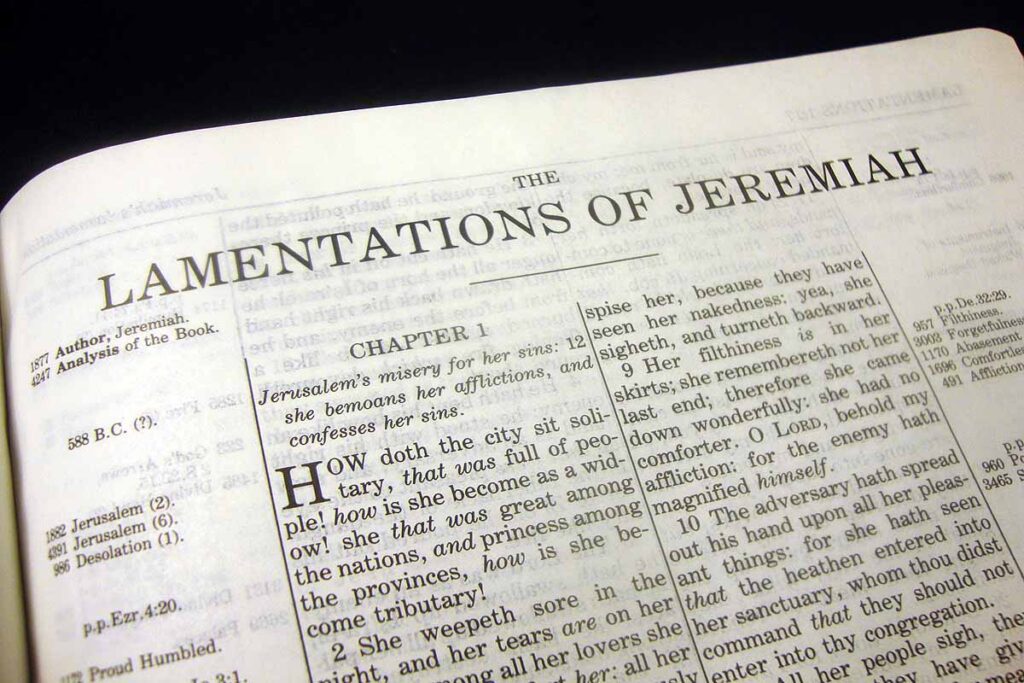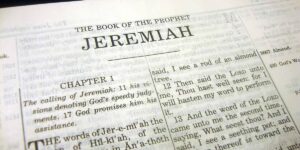In Lamentations, Jeremiah grieves deeply because of the destruction of Jerusalem and the devastation of his nation. But in the middle of his book, in the depths of his grief, there shines a ray of hope. God’s compassion is ever-present. His faithfulness is great. Jeremiah realizes that is only the Lord’s mercy that has prevented total annihilation. This book shows us the serious consequences of human sin and how we can still have hope in the midst of tragedy because God is able to turn it around for good. We see the timeless importance of prayer and confession of sin. We will all face tragedy in our lives. But in the midst of our afflictions, there is hope in God.
Jeremiah’s two books focus on one event – the destruction of Jerusalem. The book of Jeremiah predicts it, and Lamentations looks back on it. Known as the book of tears, Lamentations is a dirge, a funeral song written for the fallen city of Jerusalem.
The book of Lamentations allows us to see what made Jeremiah sorrowful. As one of God’s choice servants, he stands alone in the depth of his emotions, his care for the people, his love for the nation, and his devotion to God.
Do you weep because your selfish pride has been wounded, or because the people around you sin against and reject the God who loves them dearly? Do you weep because you have lost something that gives you pleasure, or because people around you will suffer for their sinfulness? Our world is filled with injustice, poverty, war, and rebellion against God, all of which should move us to tears and to action. Read Lamentations and learn what it means to grieve with God.
Writer of Lamentations
The author is not named, but traditions long before Christ claim that Jeremiah wrote it. Some scholars have doubted this and point to a number of differences between the use of poetic style, words, and expressions in this book and those used in the Book of Jeremiah, as well as to specific differences in emphasis. However, the prophet was known to compose laments (2 Chronicles 35:25).
Date Written
Lamentations describe the results of Babylon’s destruction of Jerusalem in 587 B.C. in vivid detail. The book has the flavor of personal experience and eyewitness testimony, particularly in the descriptions of death and starvation. Though it is possible that a long time passed between the destruction and the book’s composition, there is no compelling reason to accept this conclusion. Since temple worship had begun again by 520 – 515 B.C., the mourning for the city and temple had likely reached its height before then. The date of the writing of Lamentations probably falls between 587 and 516 B.C., with a time earlier in the era being more likely.
Purpose of Lamentations
Lamentations were most likely written to be prayed or sung in worship services devoted to asking God’s forgiveness and seeking restoration to a covenant relationship with God. Such observances began as early as the months after the temple’s destruction in 587 B.C. (Jeremiah 41:4-5). They continued when the temple was rebuilt during Zechariah’s time. As time passed, Lamentations were read and sung as part of annual observances related to remembering the temple’s destruction.
Theological Contribution
Jerusalem was the site of the Temple of God, the place where God’s presence dwelt and where sacrifices could be made to Him. In later years Jerusalem became the focal point of God’s final work of salvation in the person of Jesus Christ. The book of Lamentations reminds us of the central role which this city has always played in God’s work of redemption in the world.
Special Consideration
Lamentations has many strange expressions such as “daughter of Zion” (2:1), and “daughter of Judah” (2:5). These do not refer to daughters of these cities but to the cities themselves as daughters of the Lord. As such they remind us of the profound sorrow associated with God’s judgment of His sinful people; yet, since they remain daughters, these cities speak of great hope during desperate times.
Click here to download or print the Bible outline “Lamentations – Anguish & Hope“.





